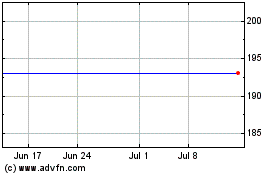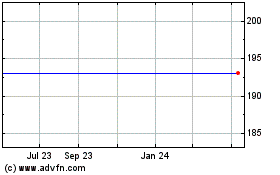Treasury Has Outsize Legal Leverage on Inversions
April 06 2016 - 4:30PM
Dow Jones News
By Richard Rubin
Pfizer Inc.'s quick abandonment of its merger with Allergan PLC
this week shows just how tough it is to challenge a Treasury
Department determined to clamp down on corporate inversions with
increasingly ambitious regulations.
Pfizer's alternative -- plow ahead and challenge the Treasury's
new rules in federal court -- would have required a gamble and a
long wait. Doing legal battle with the government would have
necessitated Pfizer proceeding with the merger so it could
challenge any taxes the U.S. tried to impose.
The consequences of trying and losing could have been enormous,
because the rules released Monday might have unraveled Pfizer's
attempt to put the combined company's tax address in Ireland -- and
subjected it to many years of back taxes.
"Presumably this is intended to have a chilling effect," said
John Harrington, a former Treasury international tax lawyer who now
advises corporate clients in Washington. "A lot of companies
wouldn't want to discover three, four years later that they were a
U.S. company the whole time."
And it could have taken even longer than that. Just last year,
tech companies scored a major victory when the U.S. Tax Court
struck down a 2003 regulation on share-based compensation -- and
that case is still under appeal.
The government's advantage is the product of a 149-year-old law
known as the Tax Anti-Injunction Act, which says taxpayers can't
sue to stop tax laws and regulations until the government has tried
to assess the tax.
That process gives the government an inherent advantage, because
Treasury can explore the boundaries of its legal authority and
scare off potential challenges. It would take an unusually
determined plaintiff -- or one that doesn't have too much money at
stake -- to take on the government. On the other hand, once the
government sets rules, companies and their tax lawyers can start
planning around them.
The chilling effect from Treasury regulations helped kill AbbVie
Inc.'s 2014 attempt to merge with Shire PLC. The collapse of the
Pfizer-Allergan deal, which would have been the largest corporate
inversion ever, marked an even bigger victory for the Obama
administration. White House press secretary Josh Earnest said
before the companies scuttled the merger that the administration
would be "pleased" if any inversions were halted as a result of the
new rules.
Even if Pfizer had challenged Treasury or if another company
does so, it is far from clear whether a court would overturn the
government's regulations. Companies could attempt to argue that the
government didn't follow proper regulatory procedures or exceeded
its authority, a case that would be bolstered by the
administration's own assertions that it lacks sufficient authority
to completely halt inversions, the deals in which U.S. companies
take a foreign address.
The Treasury Department released two separate rules Monday, each
with its own legal justification. A Treasury spokeswoman said this
week's decisions have "strong basis" and that its authority was
clear.
The one that hit the Pfizer deal targeted what the government
called "serial inverters," or companies that are part of multiple
inversion transactions. The rule would have disregarded three years
of mergers with U.S. companies that got Allergan to its current
size; that could have made Allergan too small to merge with Pfizer
and still comply with the law, which treats a merged company as
domestic if the former U.S. company's shareholders own at least 80%
after the deal.
Michael Graetz, a tax professor at Columbia Law School, said the
Treasury is on solid legal ground and that only a company doing an
inversion with minimal tax benefits would have a good reason to
risk challenging it.
"I think they would be likely to prevail in litigation on that,"
he said of the Treasury. "It would be very hard for a company that
was doing an inversion for tax reasons to push forward on the
theory that they were going to win in court."
Treasury's serial inverter regulation is more ambitious than
past efforts, said Ed Kleinbard, former chief of staff of the
congressional Joint Committee on Taxation.
"That is, to my way of thinking, a bit troubling, because you
end up concluding that a series of unrelated transactions, each of
which has real economic consequences, nonetheless have to
effectively be treated as one," said Mr. Kleinbard. He said he
supported Treasury's decision to step into the vacuum left by
Congress.
The second set of rules issued Monday applies beyond inversions.
Using Section 385 of the tax code, the Treasury Department gave
itself more ability to reclassify debt transactions as equity
investments. That would make it much harder for companies to engage
in earnings stripping, the practice of loading up a U.S. subsidiary
with deductible intercompany debt and effectively pushing profits
offshore.
That rule making may be easier -- though not much faster -- to
get into court, because the penalties of losing the case would be
that what a company considers a debt instrument would be taxed as
equity. That would be damaging, but far less than the consequences
of the government reclassifying a foreign company as domestic.
But Section 385 also contains an extremely broad grant of
regulatory authority to the government, letting the Treasury
secretary write regulations "as may be necessary or appropriate" to
differentiate equity from debt.
"Just the words of 385 make it very clear that the Treasury has
this authority," said Samuel Thompson, a tax law professor at Penn
State University. "It's really a lay-down hand."
Write to Richard Rubin at richard.rubin@wsj.com
(END) Dow Jones Newswires
April 06, 2016 16:15 ET (20:15 GMT)
Copyright (c) 2016 Dow Jones & Company, Inc.
Allergan (NYSE:AGN)
Historical Stock Chart
From Mar 2024 to Apr 2024

Allergan (NYSE:AGN)
Historical Stock Chart
From Apr 2023 to Apr 2024
